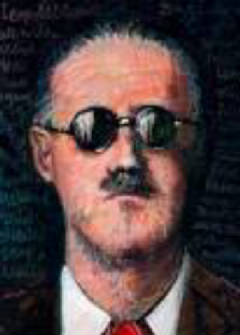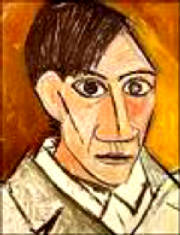23: The Creativity Question
-
|
?
|
?
|
----

---
|
?
|
?
|
WHAT SORT OF EDUCATION
PRODUCES THE MOST CREATIVE PEOPLE? |
Even as educational fads appeared and vanished
during the past century, some themes remained constant. One was a hatred for discipline, memorization and practice. Educators
claimed that these strategies produce unmotivated and uncreative students.
So what would make children
creative? Top-level educators (aka the Education Establishment) want children to learn by doing. In a whole or holistic approach,
students jump into an activity...and just do it. They are not supposed to bother too much with facts, details, precision,
rules, or reality. Just have fun.
Decades ago I first saw the phrase “rote memorization.”
It was obviously a term of contempt. How dare you expect a child to memorize anything. (This phrase, more than any other,
has been the battle cry of modern or progressive education.) More recently, educators came up with the term “drill and kill” (or chill). In effect, this phrase prohibits practice, discipline, flash
cards, exercises, subskills training, or any foundational knowledge at all. Another term of contempt, perhaps more recent,
is “teach to the test.” If students learn something because, well, they
ought to know it, their souls could be damaged. You see the pattern, I’m sure. These three phrases--spoken with scorn
and condescension-- outlawed the techniques used for the past ten thousand years in all cultures.
Educators
argued that the old-fashioned strategies had to be eradicated because they produced robotic behavior, not creativity.
So let us imagine little Jimmy Joyce going to a parochial
school circa 1895. Nuns doubtless rapping his knuckles. Memorize, memorize, memorize. Drill, drill, drill. Obviously, his
creativity would be crushed. He would be less than human. But I tell you, there is nobody more creative in the 20th century
than James Joyce, a man who absolutely towers over us all.
And let us imagine little Pablo learning at his father’s
knee. By the age of twelve he had memorized and mastered all the traditional skills used by European artists through the centuries.
Obviously he would never amount to anything. He was surely drilled and killed! All Picasso could manage was to become the
Mount Everest of artists in the 20th century.
|
|

|
As I read about the educators and their inane ideas, I imagine
Joyce writing Portrait of the Artist, Ulysses and Finnegans Wake. Here’s the message I see. If you want to be creative,
you better hope somebody does impose some skills and discipline on you.
|
Our guest of honor for this essay is Professor Robert
W. Weisberg. He wrote a book called “Creativity, Genius and other myths.” He has conducted a lot of research on
creativity. “It’s a paradox,” he says. “There is evidence that deep immersion is required in a discipline
before you produce anything of great novelty.” Novelty--he said novelty. “There is this concept that genius has
leaps of insight way beyond everybody else. If you look at the background of these people, there is much more of a progression
They don’t make leaps--they build in small pieces.” In short, Weisberg says that drills do not stifle creativity.
They engender it.
But, really, do we need a professor to tell us the obvious? Every great baseball player takes
batting drills every day. NBA superstars practice dribbling and foul shots. Every opera singer practices scales. Actors go
to classes for diction, swordplay and improvisation. All the best in every field do not hesitate to break their business down
into subskills, and to practice and drill at those pieces. Tiger Woods went back and reinvented his swing, part by part.
Here’s some more expert opinion. Professors Anderson, Reder and Simon of Carnegie-Mellon University declared:
“All evidence... indicates that real competence comes only with extensive practice. By denying children the critical
role of practice, one is denying children the very thing they need to achieve competence.” Kids, they argue, can learn
more through “deliberate practice.” Imagine that. Hold the presses.
|
Really, it’s hard
for me to write about our elite educators without laughing or crying. Much of what they recommend is like a diet of candy:
initially fun but bad over time. It seems to me their strategies don’t educate and they don’t even increase creativity.
On the contrary.
Let me try to generalize about what our educators tend to do. They cut out the substance. But
they keep the surface and appearances, and shine these to a high gloss. In math classes children talk about math and record
their feelings about math, but nobody can do any math. History classes go like this: “In World War II millions of people
died on both sides. How do you feel about this?” Whole language theory say that children should learn to read by picking
up a book, one of high quality, and just reading it. They should learn to count by pretending to operate a grocery store.
But they must not learn to count just by learning to count. The pattern throughout is to play at doing something. The goal,
it seems to me, is to keep all the students in a comfortable muddle. They end up dumbed down and without the tools to be creative.
|
|
Elsewhere on this site, I have an essay called “MAX
Your Creativity,” about experimental approaches. The essay says sometimes you might want to break a few rules and go
wild. I describe some of the techniques I and others have used. But keep in mind that most adults are doing this after 16+
years of education; there’s a lot of stuff in our brains to play around with. You need a foundation, raw materials,
fuel, knowledge, experience. You need to know the rules before you can profitably knock them around.
These educators,
with all their feel-good techniques, remind me of people I knew in Manhattan who thought they could be more creative with
the help of, let us say, chemicals. People suppose they’ll be so creative. They’ll get really loose and the creativity
will erupt. But all the people I’ve heard speak of this over the years say the same thing: you think what you create
is hot but later you see it’s not.
Sure, it’s helpful sometimes to have a few drinks or lie on a beach
and do nothing. But I think that humans, all of us, not just artists, generally like challenge, difficulties, puzzles. We
like to be tested; we want to find answers; we like discovering new routes to new worlds. If everything is easy and soft,
why do we need to be creative? Creativity is not about having a head full of mush and lying around in mush. Being an artist
is all about going boldly where nobody went before. Struggle on, dude!
There used to be a cliché in our
culture: grist for one’s mill. Everything is grist for an artist’s mill. The more stuff the better, it seems to
me. (That means more dots that you can connect in an original way!) It’s really sad to think of children in bad schools
pushed along from year to year, knowing almost nothing. No grist at all. After a while, the mills shut down for lack of activity....
Here's what I think is happening. Creativity is a positive, fuzzy, feel-good word. Everyone is in favor of it. So
educators exploit the word. They drag it on stage to justify their let's-educate-as-little-as-possible campaign. They use
creativity to undermine things they wanted to undermine anyway. They cannot sincerely embrace creativity. Here's why. Among
American educators, no theme has remained more constant throughout the 20th century than a hostility toward individual accomplishment.
What else is creativity?
|
|
I should close by noting that I’m all in favor of kids having
fun in schools. I was never in a single course that couldn’t have been made more entertaining and taught more creatively.
But the fun has got to be a means, not an end. The apparent reality is that many of our educators don’t like knowledge,
or they don’t believe certain students need much of it. I hate this attitude. I say, give children all the knowledge
they can handle. Then charm, trick, coerce and cajole them into learning even more. They'll be better, more productive citizens
that way. And probably more creative as well.
|
|
This article first appeared on the Creativity-Portal.com
|
|
pablo
|
|

|
|
picasso
|
| |
ADDENDUM I:
Ken Robinson, England’s creativity guru, is famous for promoting more creativity in schools. Problem is, he makes it
an either/or situation. He talks as if we have to vanquish traditional academic activity:
“All over the world, formal education systematically suppresses creative thinking and flexibility. National strategies
to raise standards in education are making matters worse...In the interests of raising traditional academic standards, schools
are now encased in standardized testing regimes that shrivel the creativity of teachers and students alike.”
Robinson basically proposes junking most of what we call schooling and instituting a creativity curriculum. I believe this
is bunk. The problem now is that the children have empty heads First, put a lot more in their heads. Second, perhaps a few
times a week, do have a class where students are told, “Here there are NO rules. We think about each question as if
nobody has EVER thought about it before.”
Then you have the best of both worlds.
In Robinson’s talk, there is a terrible blurring about what might be good for formally educated adults (let’s
say computer geeks at Microsoft who may actually profit from spending a week in the country sniffing flowers) and young teenagers
who don’t know any math, history, science, etc.
The scary aspect here is that educrats will use Robinson’s sermons on creativity to undercut the academic rigor we still
have.
|
|
Related article: "45: The Crusade Against Knowledge" The dirty word for educators is Content. They will try any dodge, it appears, rather than let schools teach Content. Also see "29: The Rules of
Poetry."
© Bruce Deitrick Price 2009-11
|
|